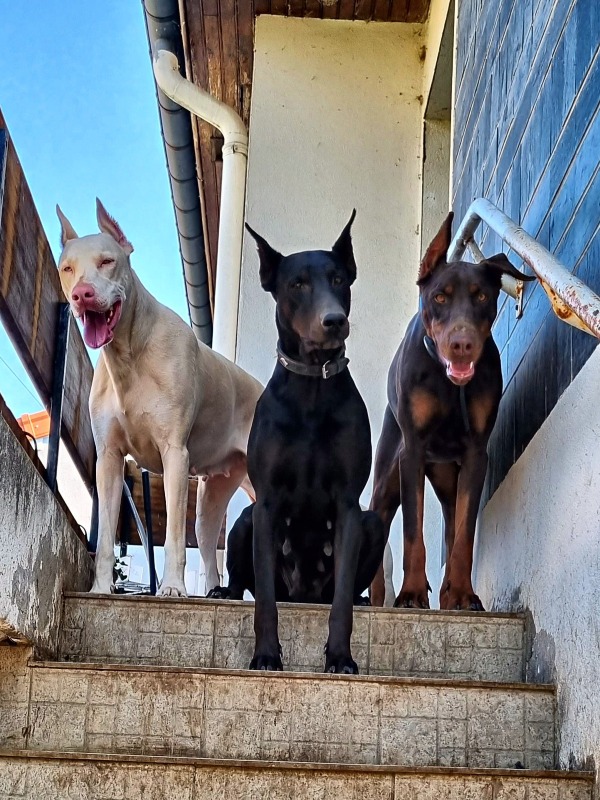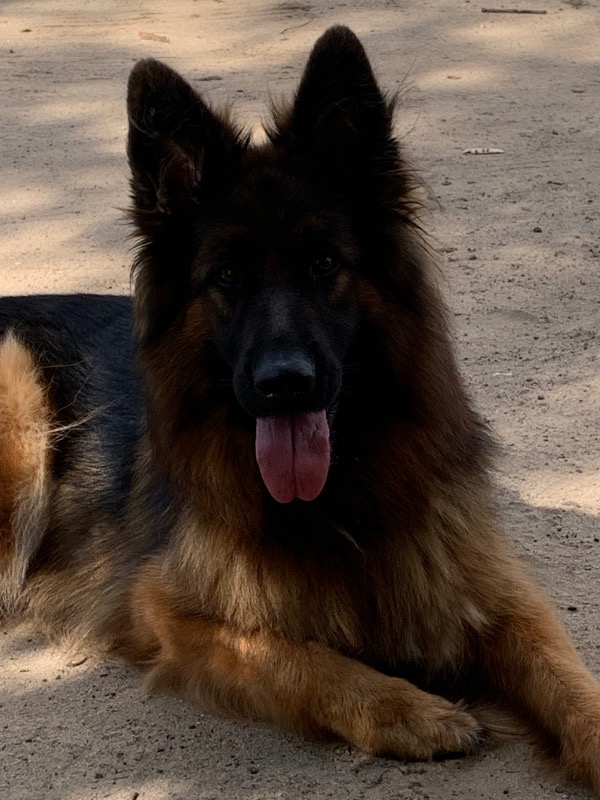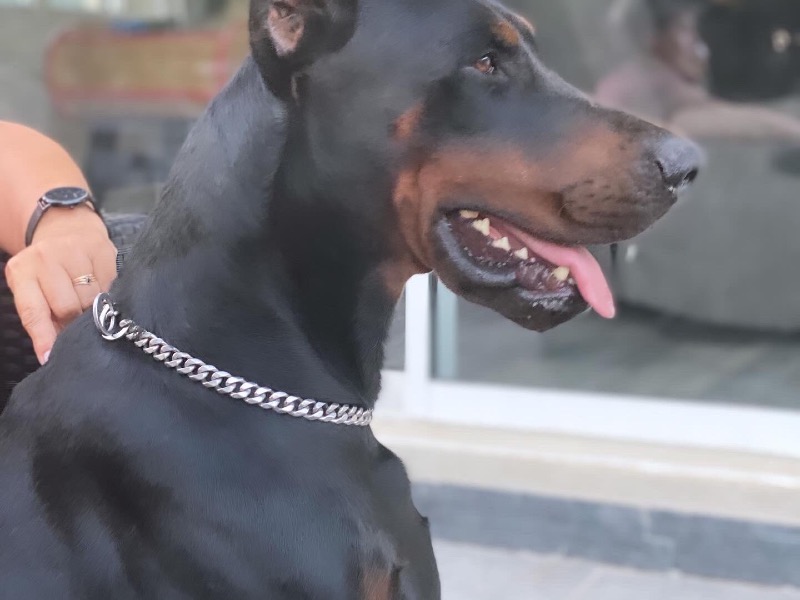Dobermann
Autres noms : Dobermann pinscher, Dob dog, Doberman
Discover the Doberman, a loyal and protective dog known for its intelligence and agility. Ideal for families and guarding, this elegant companion combines strength and gentleness. Learn all about its characteristics, training, and well-being.
Awareness of acquiring an animal
Adopting or breeding a dog is a responsibility that must be carefully considered. Dogs are loyal companions that require time, attention, and constant care. Whether for leisure, passion, or professional breeding, it is crucial to understand the specific needs of each breed. Provide them with a loving and stimulating environment, and avoid any impulsive acquisition that could harm their well-being. Be a vigilant and committed owner for a happy and healthy companion.
To learn more about animal welfare, we invite you to consult our FAQ by clicking the button below:
Origins and history
The Dobermann was developed in Germany in the late 19th century by a man named Karl Friedrich Louis Dobermann. At that time, Dobermann, a tax collector, was looking for an effective guard dog to accompany him on his rounds through unsafe areas. To achieve this goal, he crossed several breeds, including the Rottweiler, the Greyhound, and the Pinscher, to create a dog that was both protective, enduring, and intelligent.
The first official recognition of the breed occurred in 1899 when the Dobermann was presented at a dog show. The popularity of this breed quickly skyrocketed, and its development intensified thanks to passionate breeders who established standards for temperament and physique. Over the years, the Dobermann became a sought-after working dog in various fields, including police forces and military operations.
In the 20th century, the popularity of the Dobermann continued to grow, particularly due to its imposing appearance and loyalty to its family. However, the breed also faced negative stereotypes, often associated with aggression. This issue led to educational efforts to demonstrate that training and socialization are essential for good behavior. Thanks to these efforts, the Dobermann is now recognized as a loyal companion and a vigilant guardian.
Physical characteristics
The Dobermann is a dog breed that stands out for its elegant and muscular appearance. It has an athletic stature, with a well-proportioned body. The typical height of an adult Dobermann ranges between 60 and 70 cm at the withers, with males generally being larger and heavier than females. Its weight varies between 30 and 40 kg, giving it a commanding presence.
The Dobermann’s coat is short, smooth, and dense, providing good protection against the elements. It primarily comes in two colors: a black base with fawn markings, or a chocolate color with fawn markings as well. These markings are mainly located on the face, chest, legs, and around the anus, adding to its expressiveness.
The limbs of the Dobermann are long and muscular, contributing to its agility and speed. Its head is elongated, with a broad skull and well-developed cheeks. The eyes, almond-shaped, are often dark in color and have a lively and attentive expression. Finally, its ears, which are traditionally cropped, can be left natural, giving the dog a gentler and less austere appearance. This blend of power and elegance makes the Dobermann a breed that is both impressive and alluring.
Character
The Doberman is a dog breed known for its intelligence and loyalty. These animals are often described as being very attached to their owner, developing a strong bond with their family. Their protective instinct is pronounced, which makes them excellent guard dogs. This disposition leads them to be vigilant and attentive to their environment, traits that can prove valuable in security situations.
Moreover, Dobermans are also known for their energy and dynamism. They require regular mental and physical stimulation. This makes them ideal companions for active individuals or families who enjoy spending time outdoors. Due to their need for exercise, it is crucial to provide them with varied activities to prevent boredom and the destructive behaviors that can result.
Finally, their temperament can vary depending on the socialization and training they receive. With proper training, a Doberman can become a well-balanced pet that is well-suited for family life. In summary, this breed combines intelligence, loyalty, and a need for activity, making it an excellent choice for dedicated owners.
Life expectancy
The life expectancy of a Doberman generally ranges from 10 to 12 years. Like many dog breeds, longevity can vary based on several factors, including genetics, diet, and veterinary care. Dobermans are often prone to certain hereditary diseases that can affect their lifespan. Common health issues include hip dysplasia, heart diseases, and certain types of cancer.
To maximize a Doberman's life expectancy, it is essential to provide them with a balanced diet appropriate for their age and activity level. Regular physical activity is also crucial, as these dogs need exercise to stay healthy, both physically and mentally. Additionally, regular visits to the veterinarian can help detect potential health issues at an early stage, which can significantly contribute to prolonging their lives.
Finally, a loving and stimulating living environment is also an important factor for a Doberman's overall well-being. An environment rich in social interactions and activities can promote their mental and physical health, potentially improving their life expectancy. By considering these various aspects, it is possible to support these dogs towards a long and fulfilling life.
Exercise and activity needs
The Doberman is a dog breed known for its intelligence, loyalty, and athleticism. To meet their specific needs, a high level of exercise is necessary. A minimum of 60 to 90 minutes of physical activity per day is recommended. This can include walks, runs, or interactive games. These dogs need to expend energy to prevent boredom and avoid destructive behaviors.
Beyond physical exercise, mental activity is equally crucial. Dobermans are very intelligent dogs, and activities such as obedience training, puzzle games, and scent tracking stimulate their minds. These mental challenges help them focus and remain calm.
Socializing these dogs from a young age is also essential. Interactions with other dogs and people allow them to develop good behavior and reduce anxiety. Thus, a combination of physical exercise, mental stimulation, and socialization is key to ensuring the well-being and flourishing of a Doberman.
Recommended diet
The diet of the Dobermann requires special attention to promote its health and well-being. This dog, known for its athletic ability and energy, needs a balanced nutrition that supports its high activity level. Foods rich in quality protein are essential, as they help to develop and maintain its musculature. Animal protein sources, such as chicken, beef, or fish, should form the basis of its diet.
Complex carbohydrates, found in ingredients like brown rice or sweet potatoes, provide the necessary energy for daily activities. Fiber, on the other hand, supports digestive health and helps prevent gastrointestinal issues. It is also important to include healthy fats, such as fish oil or flaxseed oil, which promote a shiny coat and healthy skin.
Finally, hydration is crucial. Ensure that your dog always has access to fresh water. It is recommended to feed the Dobermann with high-quality meals, specially formulated for large breeds, and to consult a veterinarian to choose the best diet based on the dog’s age, weight, and health condition. A personalized approach will ensure the longevity and vitality of your companion.
Training and obedience
Training and educating a Dobermann requires a structured and consistent approach. Due to their intelligence and sensitivity, these dogs respond well to training methods based on positive reinforcement. It is essential to use rewards, such as treats or praise, to encourage desired behaviors. The approach should be gentle yet firm, as a Dobermann can become disobedient if it feels threatened or mistreated.
Socialization is a crucial step in the education of this breed. It is important to expose the dog to a variety of people, other animals, and environments from a young age to prevent fearful or aggressive behaviors in adulthood. Socialization classes can be beneficial for acclimating the Dobermann to different stimuli.
Finally, consistency in training is vital. Training sessions should be regular and varied, including basic obedience exercises as well as more complex activities to stimulate their minds. The Dobermann, due to its energy and intelligence, needs regular physical and mental challenges to remain balanced and happy.
Behavior with children
The behavior of Doberman breed dogs with children is generally positive, although it is essential to consider several factors to ensure a harmonious coexistence. As a rule, these dogs are known for their loyalty, intelligence, and instinctive protection, which can make them excellent companions for children. Their protective nature drives them to want to defend their family, including the youngest members.
However, the dog's upbringing plays a crucial role in their behavior. A well-socialized and properly trained Doberman from a young age will tend to be gentle and patient with children. It is imperative to initiate positive interactions between the dog and the child, ensuring that the dog becomes accustomed to the presence, noises, and sometimes unpredictable movements of children.
It is also important to supervise interactions between the dog and children. Young children may not understand the dog's signals and may inadvertently provoke an undesirable reaction. Teaching children to respect the dog's personal space and to interact appropriately will contribute to a harmonious relationship. In a family setting, a good balance of education, socialization, and supervision will promote a safe and fulfilling coexistence for everyone.
Compatibility with Other Animals
The Doberman is a dog breed that can get along well with other pets if properly socialized from a young age. Their protective and loyal temperament toward their family makes them capable of forming positive relationships with other animals, including dogs, cats, and small pets. However, it is essential to introduce these animals in a controlled environment to avoid any dominating or excessively protective behavior.
Socialization should begin at a very young age. This involves gradual exposure to different animals and situations to help the Doberman develop social skills. Visits to dog parks, meetings with other animals, and group training sessions can enhance their interactions. A well-socialized Doberman will learn to recognize and accept other animals as part of their environment.
However, each individual has its own temperament. Some Dobermans may have a more pronounced hunting instinct, making them less compatible with small animals like rodents or birds. It is crucial to monitor interactions and intervene promptly if aggressive or overly excited behaviors arise. Proper guidance and consistent training generally ensure harmonious coexistence with other pets.
Grooming needs
Dobermans are short-haired dogs that require minimal grooming compared to other breeds. Their smooth, dense coat needs regular brushing, about once a week, to remove dead hair and maintain the shine of their fur. This brushing also helps control shedding, which can be beneficial for allergy sufferers.
When it comes to bathing, these dogs do not need to be bathed frequently. A bath every few months is usually sufficient, unless they get dirty in muddy places. It is recommended to use a specific dog shampoo to maintain the health of their skin and coat.
Ear care is also essential, as Dobermans can be prone to infections. It is advisable to check their ears regularly and clean them with a product recommended by a veterinarian. Their nails should be trimmed regularly to prevent them from becoming too long and causing pain or mobility issues. Finally, good dental hygiene is crucial, with teeth brushing several times a week to prevent dental diseases.
Health
The Dobermann is a robust breed of dog, but it has certain health concerns that it is essential to be aware of in order to ensure its well-being. Among the most common issues, heart diseases, particularly dilated cardiomyopathy, are especially concerning. This condition affects the heart's ability to pump blood effectively, potentially leading to severe symptoms and requiring regular veterinary monitoring.
Another common issue is hip dysplasia, a malformation of the hip joint that can cause pain and reduced mobility. Early detection and appropriate management, including suitable exercise and possibly medical interventions, are crucial for improving the animal's quality of life.
Dobermanns are also sensitive to certain genetic diseases, such as degenerative myelopathy, which affects the spinal cord, and vulnerability to infections. Therefore, it is recommended to conduct genetic testing and choose responsible breeders. Regular veterinary check-ups, a balanced diet, and adequate exercise can help prolong life and maintain the health of this breed.
Environment and habitat
The Dobermann is a dog breed that requires a balanced environment to thrive fully. Originating from Germany, this breed was developed for work and protection, which gives it specific needs in terms of space and activity.
Regarding its habitat, the Dobermann flourishes in a setting where it has sufficient space to run and play. A fenced garden is ideal to allow this energetic dog to let off steam safely. It is important to avoid overly confined environments, which can lead to anxiety or destructive behavior.
Socially, this dog requires daily interaction with its owners. Living in an apartment is possible, but it must be complemented by regular outings and exercise. This breed is also sensitive to extreme climates; adequate shelter is necessary for protection against cold and heat. In summary, a stimulating and secure environment, combined with sufficient socialization and physical activity, is essential for the health and well-being of the Dobermann.
Name ideas
Choosing a name for a dog, such as a Dobermann, is based on several important criteria. First of all, it is preferable to choose a short and easy-to-pronounce name. Dogs respond better to words that contain high-pitched sounds, so opt for impactful names.
Next, think about the personality of your Dobermann. These dogs are often confident, protective, and intelligent. Therefore, a name that reflects their characteristics can strengthen your bond with them. For example, a name that evokes strength or nobility may be perfectly suited.
Finally, avoid names that are too similar to basic commands. This helps to prevent confusion during training sessions or daily communication.
Here are some name suggestions for a Dobermann: Titan, Zeus, Shadow, Goliath, Astra, Sphinx, Blaze, Nova, Rex, Valkyrie, Fury, Juno, Orion, Draco, and Kira. These names are inspired by power and elegance, in line with this unique breed.
Average purchase price
The cost of purchasing a purebred dog can vary significantly depending on many factors, and Dobermans are no exception. On average, the price of a Doberman puppy ranges from 1,000 to 2,500 euros. This cost can be influenced by the breeder's reputation, the lineage of the parents, as well as the quality of the bloodline.
Reputable breeders invest heavily in the health and well-being of their animals, which can explain the higher price range. These breeders often perform health tests on the parents, ensuring that the puppies are born with the least possible issues. That said, it is essential to be wary of very low prices, which may hide unethical breeding practices.
In addition to the initial purchase price, it is also important to consider the ongoing costs associated with dog ownership. This includes food, veterinary care, grooming, and possibly training classes. All of these expenses can quickly add up to the initial purchase cost, so it is wise to plan a solid budget for welcoming a Doberman puppy into your life.
Expenses
Owning a Dobermann dog involves several monthly expenses that can vary depending on the individual needs of the animal. On average, it is reasonable to budget around 100 to 150 euros per month for food. This amount may fluctuate based on the quality of the chosen kibble and the size of the dog.
Veterinary care also represents a significant portion of the budget. On average, it is advisable to set aside between 30 and 50 euros per month for routine care, vaccinations, and preventive treatments against parasites. Unexpected expenses may arise if needed, particularly for emergency consultations or specific treatments.
Expenses related to training and socialization can also add to this budget. Approximately 20 to 60 euros per month can be allocated for obedience classes or canine activities. Lastly, we should not forget about accessories, such as toys, collars, and bedding, which can add around 10 to 30 euros per month. Therefore, it is reasonable to estimate a total monthly budget of 200 to 350 euros for the maintenance of a purebred dog.
Destination and usage
Dobermans are often chosen as pets due to their protective nature and intelligence. Their loyalty to their owners makes them excellent guard dogs. They are alert and responsive, making them particularly effective at warning of intrusions. Their imposing appearance attracts attention, but it is their affectionate behavior that endears them to many families.
As pets, these dogs require proper socialization from a young age. This helps them develop good interactions with other animals and people. Dobermans are also known for their energy and need for exercise. They thrive in environments where they can expend energy, whether through walks, play sessions, or canine activities.
Furthermore, their intelligence makes them suitable for participating in various dog sports, such as agility or obedience. These activities strengthen the bonds with their owners while fulfilling their physical and mental needs. When well-educated and well-treated, Dobermans become loving and loyal companions, bringing joy and security to their homes.
Legislation and regulation
The legislation regarding Dobermann dogs varies significantly around the world, reflecting cultural differences and concerns about safety. In some countries, such as Germany and France, this breed is often subject to strict regulations, including requirements for muzzles and leashes in public places. These laws aim to reduce incidents related to bites and ensure the safety of citizens.
Other nations adopt a more permissive approach, allowing owners to keep these dogs without major restrictions, as long as they adhere to general behavioral rules. In the United States, for example, laws vary from state to state, with some jurisdictions imposing no specific restrictions, while others may classify this breed among dogs considered potentially dangerous.
Conversely, countries like England have implemented bans on certain breeds, complicating the ability for owners to adopt animals from this category. These regulations often aim to address public concerns about bite incidents while raising debates about the stigmatization of breeds.
Thus, legislation regarding Dobermanns illustrates a delicate balance between protecting the public and the rights of owners to have pets valued for their loyalty and intelligence.
Official recognition
The Doberman is a dog breed originating from Germany, recognized for its intelligence, loyalty, and exceptional working abilities. In many countries, this breed is officially acknowledged by major canine organizations. In Europe, for example, the Fédération Cynologique Internationale (FCI) has established a recognized standard that defines the criteria for this breed, allowing for uniformity in breeding.
In the United States, the American Kennel Club (AKC) classifies this breed among working breeds, emphasizing its skills as a guard and protection dog. Breeders and owners are encouraged to adhere to these standards to maintain the quality of the breed. This also helps combat prejudices associated with breeds perceived as potentially dangerous.
However, in some countries, the popularity of the Doberman can be controversial. There are legislations that may restrict the ownership of this breed. These regulations often aim to protect the public but can raise concerns among enthusiasts and breeders, who advocate for education on dog management and behavior. Thus, the official recognition of the Doberman varies according to local laws but remains predominantly positive on an international level.
Pedigrees
To obtain a pedigree for a Doberman, it is crucial to contact recognized registers or clubs that specialize in the breed. First and foremost, the Fédération Cynologique Internationale (FCI) is the global organization that recognizes and manages the standards of dog breeds, including that of the Doberman. It issues pedigrees that comply with international standards.
In France, the Livre des Origines Français (LOF) is the national entity responsible for the registration of purebred dogs. For Dobermans to be registered with the LOF, they must come from parents who are themselves registered. This ensures a certain level of compliance with the breed's standards.
Breed clubs also play an essential role. The Club Français du Doberman (CFD) is one of the main groups dedicated to the promotion and preservation of this breed. They organize events, meetings, and provide resources for owners and breeders to ensure responsible breeding.
Thus, to obtain a pedigree for a Doberman, it is recommended to consult the FCI, the LOF, and specialized associations like the CFD, which guarantee serious and respectful monitoring of the breed.
Prohibitions
The Dobermann is a dog breed that evokes mixed feelings around the world. In several countries, bans or strict regulations are in place for this breed, often due to a perception of danger. These restrictions aim to prevent incidents, despite the fact that behavior often depends on training and socialization.
In Europe, some countries like Ireland, Denmark, and the Netherlands have enacted laws prohibiting the possession of these dogs. These regulations are often based on statistics of dog attacks or reported incidents. It therefore becomes crucial for potential owners to thoroughly research local legislation before considering adoption.
In the United Kingdom, the legislation regarding the possession of these animals is less restrictive, but specific regulations may apply, including enhanced safety requirements. Owners must demonstrate an ability to manage their dogs' behavior, which involves proper training.
In other parts of the world, such as certain areas of the United States, local jurisdictions may impose varied regulations. Some cities have explicit bans on this breed, while others focus on owner responsibility without completely prohibiting possession.
In summary, restrictions concerning this dog breed vary significantly between countries and localities, often influenced by socio-cultural considerations and public safety concerns. It is therefore essential to understand the applicable legislation in one’s region to avoid legal complications.
Breeders of Dobermann
Want to see more breeders of Dobermann?
Check out the page of our directory listing all breeders of DobermannClassified Ads of dobermann
No of dobermann classified ads are available on Preeders.
If you’re a breeder, sign up for free now and be the first to post a classified ad
Breed clubs of dobermann
No of dobermann breed clubs are currently registered on Preeders.
If you would like to highlight your breed club, sign up for free now and be the first to appear on this page.






